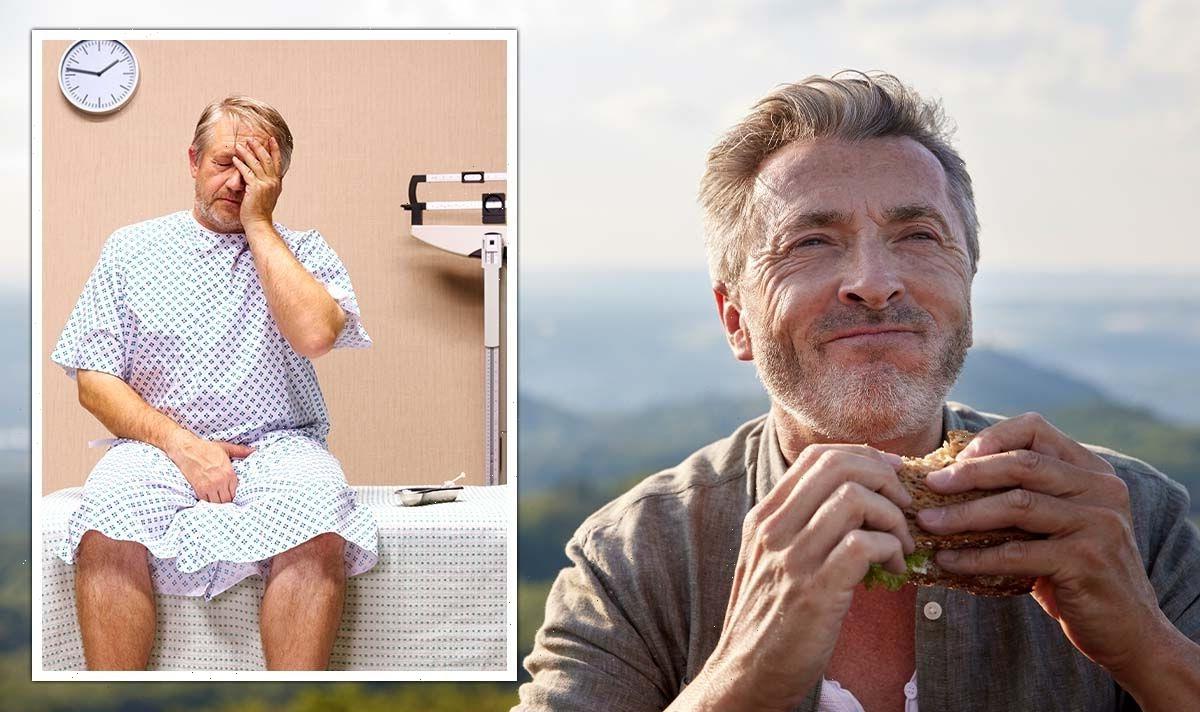Prostate cancer: Prost8 charity discusses current treatment
We use your sign-up to provide content in ways you’ve consented to and to improve our understanding of you. This may include adverts from us and 3rd parties based on our understanding. You can unsubscribe at any time. More info
One of the foods Doctor Ruxton recommends to avoid are foods and substances which are found in a classic British staple: the bacon sandwich.
While a form of revival after exercise or a form of recovery after the exertions of the night before, bacon sandwiches are high in salt, fat, and processed meat; ingredients which have been linked to prostate cancer.
One study, published in February of this year concluded that “increased consumption” of “total meat” and “processed meat” might be associated with a higher risk of prostate cancer.
While this may sound unnerving and prompt the binning of said sandwich, Doctor Ruxton said it is only a case that these “might be linked with prostate cancer risk, although the evidence is weak so it could be due to the fat and salt levels in these products”.
Doctor Ruxton added: “Diets high in sugar, saturated fats, and salt – which are typically low in vitamins and minerals – have been linked with an increased risk of prostate cancer.”
Furthermore, the study in question was analysing the impact of high consumptions of processed meat rather than the occasional engorgement of a British favourite which, should a person require it after exercise, help return visceral fat to a healthy level.
However, prostate cancer risk isn’t just about avoiding the wrong foods, it is about choosing the correct foods, ones that will boost levels of minerals and vitamins in the body.
To this end, Doctor Ruxton recommended: “A diet including a high consumption of vegetables, fruits, beans and pulses, wholegrains and fish may help exert a protective effect against prostate cancer.”
Furthermore, Doctor Ruxton added: “[The] Mediterranean diet may slow the progression of prostate cancer in those who have it.” Doctor Ruxton referenced a study published in 2022 which demonstrated that men following this diet were more likely to survive prostate cancer than those who didn’t.
The study concluded: “Findings of the present study support the beneficial impact of pre-diagnostic adherence to the Mediterranean diet and physical activity on overall survival after prostate cancer diagnosis, mainly due to lower non-PCA specific mortality.”
While the findings were positive, the authors added they had “found no suggestion that the Mediterranean diet was associated with reduced cancer-specific mortality”.
Although diet can play a role in prostate cancer risk, it is not considered the most significant risk factor of the disease, according to Doctor Ruxton.
Of all the risk factors for prostate cancer, the most significant one is that which no one can control: ageing. As people grow older, their bodies become more vulnerable to threats both from external and internal threats.
Other risk factors for prostate cancer include:
• Ethnic group
• Family history
• Obesity.
However, while constantly maintaining a diet of high quality and healthy food may be difficult when the world is as busy as it is, treating prostate cancer poses even greater challenges.
The reason for this is because it is very difficult to detect early as it very rarely causes symptoms until it has reached a later stage. Typical symptoms of prostate cancer include:
• Needing to urinate more frequently
• Needing to rush to the toilet
• Difficulty in starting to pee
• Straining or taking a long time while urinating
• Weak flow of urine
• Feeling that the bladder has not emptied fully
• Blood in urine or semen.
A note of warning.
If a man experiences these symptoms, it does immediately guarantee that they have prostate cancer; rather, if these symptoms continue it is recommended by charities such as Prostate Cancer UK and the NHS that a GP is consulted.
The NHS adds: “Many men’s prostates get larger as they get older because of a non-cancerous condition called benign prostate enlargement.” Nevertheless it is important to get checked if something doesn’t feel right.
What is most important when it comes to cancer is not treatment, but time. The sooner it is diagnosed the sooner someone can begin treatment and the less treatment they’ll need in order to recover.
It is for this reason that it is essential to get checked by a GP or health professional if anything doesn’t look or feel right. While it may be nothing, it is far better to know it’s nothing than to live in fear because action wasn’t taken at a time when that action could have made a difference.
Source: Read Full Article


